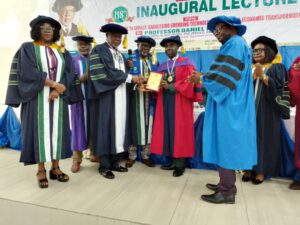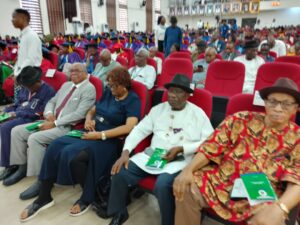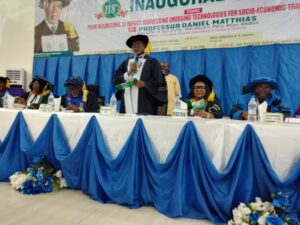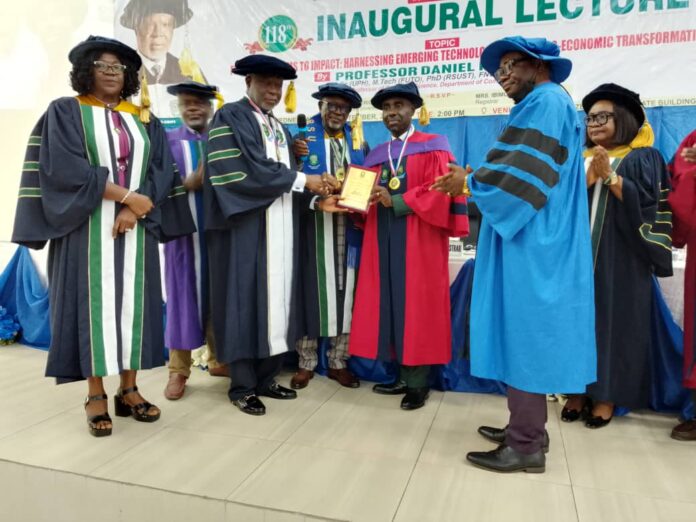Algorithms, the backbone of emerging technologies such as Artificial Intelligence, Blockchain, Internet of things, Quantum Computing and Biotechnology, and their effects, is a reflection of transformative power of technology when applied intentionally and ethically for rapid development of the society.
A lecturer in the Department of Computer Science, Rivers State University, Port Harcourt, Professor Daniel Matthias, stated this on Wednesday when he delivered the 118th Inaugural Lecture of the University titled, “From Algorithms to Impact: Harnessing Emerging Technologies For Socio Economic Transformation.”

Prof Matthias who described Algorithm as a, “Finite, step by step set of institutions designed to solve a specific problem or perform a task”, said they are fundamental to both Computer Science and everyday life, where they serve as recipes, driving directions, or the instructions a computer used to sort data, make recommendations on social media or rank search engine results. They take input, process it through a sequence of logical steps, and produce and output.”
The university don emphasized that Africa has the most youthful population globally with entrepreneurial spirit and therefore stands at a pivotal moment to harness the potential of the technologies enabled by the algorithm to drive sustainable development.
He noted that in an era where technology is no longer a spectator in the game of societal development, with AI diagnosing diseases, to data analysis predicting natural disasters, there is no doubt that technology shapes the world.

“Africa, with its youthful population and entrepreneurial spirit, stands at a pivotal moment to harness the potential of these technologies. By addressing infrastructure deficits, fostering digital literacy, and creating supportive policies, the continent can leapfrog traditional development pathways and establish itself as a global innovator,” Prof Mathias stated.
According to him, though Africa has its challenges in infrastructure deficits such as access to technology, logistics and transportation, educational barriers in the areas of quality education and digital literacy, limited investment and informal economies, the continent has promise of potential growth with the development and use of Algorithms.
Prof Matthias attributed the potential promises to demographic advantage, ecosystems, noting that Africa has the potential to leapfrog traditional stages of technological development by adopting mobile and digital solutions directly. Furthermore, he said that focusing on renewable energy and sustainable practices can help Africa address energy shortages while promoting environmental stewardship.
He postulated that emerging new technologies in AI, Blockchain, Internet of Things, Quantum Computing, and Biotechnology are no longer just theoretical constructs, but are reshaping industries, improving lives, and addressing critical challenges in Africa and beyond, citing studies in healthcare, land registry systems, flood monitoring, and renewable energy as how technology can be harnessed for socio-economic transformation, fostering resilience, equity and economic growth.

“By bridging the gap between technical knowledge and societal needs, we can create technologies that not only solve problems, but also empower communities, foster inclusion, and drive sustainable development. Collaboration, advocacy, and mentorship are essential to ensuring that technology serves as a tool for equity, empowerment, and a better future for all,” the university Don stated.
For Africa to benefit immensely from emerging technologies, Prof. Matthias recommended the strengthening of research in emerging technologies through the establishment of dedicated research centres in AI, IoT, Blockchain, and Renewable Energy. He also advocated linking computer science with health, agriculture, and engineering as interdisciplinary projects.
He further recommended the promotion of digital literacy, Science, Technology, and Mathematics (STEM) capacity building through integrating digital skills and coding from first year across all faculties in universities and similar institutions. He called for the expansion of postgraduate and professional training programmes in data science, cyber security, and machine learning.
Prof Matthias further suggested encouragement for innovation and incubation through developing innovation hubs where students and staff can build prototypes and grant support to start-ups and tech-driven enterprises through seed funding and mentorship.
While urging for a university-industry- government partnership in order to strengthen collaborations for internships, applied research, and product development, Prof. Matthias recommended that research outcomes should align with societal needs, especially in healthcare, environment, education, and governance.
Prof. Matthias, who described himself as not merely a computer scientist who is focused on the abstract world of algorithms but a scholar striving to connect computational innovations with tangible societal progress, enumerated some of his contributions to real-world contexts, which include, developing machine learning models for public health, promoting open-source tools for education, and mentoring students to become tools for education.
Prof. Matthias also highlighted his computational intelligence on healthcare delivery in Nigeria during the COVID-19 pandemic, maternal and neonatal health statistics as significant strides. He also made significant contributions in the areas of security, privacy, and digital trust, smart cities, transportation, infrastructure, big data, cloud, and the digital economy, where his contributions “illustrate that algorithms are not merely mathematical constructs, but also facilitators of trust, privacy, and governance in the digital era,”.
In his closing remarks, the Vice Chancellor of the Rivers State University, Prof. Isaac Zeb-Obibi congratulated the lecturer, describing the lecture as “fantastic” and the lecturer, as “our rare gift to Africa and the world in the field of Computer Science.”
He acknowledged that most of the recommendations of the lecturer were in consonance with what the university was doing in terms of developing a policy on the use of AI and making the university community to be digital compliant.




